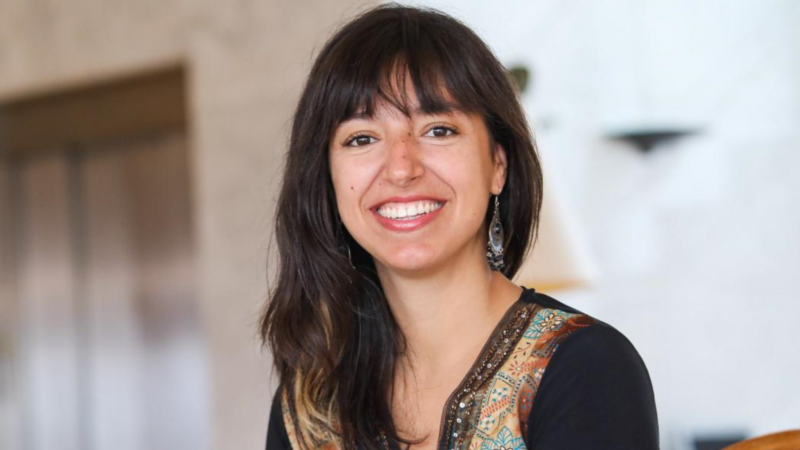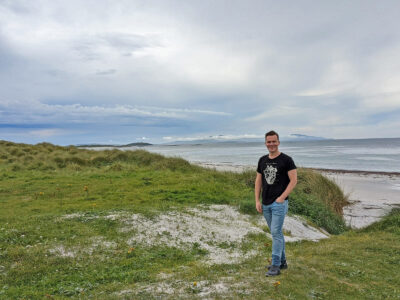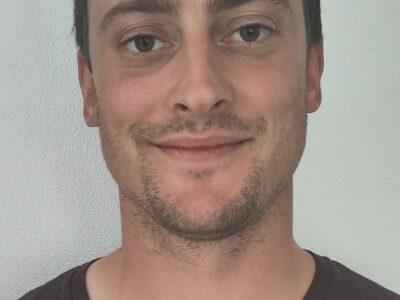
Photo courtesy Mariona Miret
As part of our ongoing series highlighting the work of activists promoting European minority and regional languages in digital spaces, we would like to feature Mariona Miret (@lamarionamiret) working with the Occitan language.
Find out more about Mariona's work in the following e-mail interview conducted by Rising Voices.
Rising Voices (RV): Tell us about yourself and your language-related work.
Mariona Miret (MM): I am a language revitaliser and Occitan language activist from Lleida, Catalonia. My mother tongue is Catalan, and I came in contact with Occitan for the first time when I was 19 years old, while I was studying language and literature at university.
It was one of the subjects being offered. It became evident that Occitan was something fascinating to me, so it became my speciality. I also studied a Master's in International Relations.
While I was living in Sardinia, Italy, I experienced what it meant to face a language extinction situation, and that left a deep imprint on me. From then on, I became more active to understand the situation of minority language communities in Europe, and since 2020 I have been collaborating as the Representative of the Chambra d'Òc Association's International Mission, which promotes Occitan in the mountain valleys of Piedmont, Italy.
To me, languages are the root of who we are and of the future. And it became evident that I wanted to make this my job, so I did it. At the present moment I am an entrepreneur focused on language revitalisation. I offer my services of translation, organisation of cultural events about Occitan language and culture and internationalisation strategies for institutions.
One of my lines of research is the emotional depth of what it means to be losing and grieving the extinction of one's own language: the Langrief project. Another interest area is technology: I participate in the LITHME COST [European Cooperation in Science and Technology] Action network, which has the aim of facilitating long term dialogue between linguists and technology developers. Moreover, I am part of the organising committee of the Ostana Prize, the festival of language biodiversity.
RV: What is the current state of your language both online and offline?
MM: Occitan is an endangered language. Ethnologue updated the status of Occitan in 2021 to “Threatened.” Minority Rights Group International estimates that Occitan is spoken in a vast territory in the South of France with a total of around 14 million inhabitants: 600,000 people are fluent, whilst 1,600,000 individuals are occasional speakers.
There are no sociolinguistic surveys done across all the Occitan-speaking territories. The most recent one was done in 2020 by OPLO in Occitanie and Nouvelle-Aquitaine regions, showing that Occitan is used by 5 to 9 percent of the population in some French departments, and up to 22 percent in Lozère, Avayron and Val d’Aran.
The language is losing speakers, but is still used for face-to-face communication by all generations. Around 90,000 students access schooling in Occitan in bilingual primary and secondary schools, and in privately-run schools called Calandretas.
Several large projects to revitalise Occitan have also been carried out, such as Linguatec (2014–2020), a POCTEFA-funded [regional funding agency] project for cross-border cooperation for language technology to develop digital instruments for the languages of the Pyrenees through the transfer of competences and collaboration.
According to Lo Congrés, in the coming years the language will have a lexicon and corpus, and automatic language processing tools (automatic translation, synthesis and voice recognition, spell checkers, telephone keypads).
These tools will ensure better visibility of the language in the digital space. A great deal of awareness-raising work remains to be done, as well as the integration of basic tools into applications (automatic translation of websites, social networks and tools in online, reading websites, GPS, announcements in Occitan in public transport, chatbots, etc.).
Until now, there have been few websites in Occitan. Given the low number of speakers, it is always necessary to double with a version in French (or Spanish/Italian), therefore bilingual, for non-Occitan speakers, which represents a significant work.
One of the most basic problems is that there are no monolingual speakers of Occitan. There are hardly even any native speakers left. If they have the choice between content in Occitan and content in their mother tongue, many speakers choose their mother tongue. It is a break on the use of the language online and elsewhere.
RV: What are your motivations to see your language present in digital spaces?
MM: The internet is a normal space for communication nowadays. And as normal as it is to read and interact with each other in English, it should be normal to do it as well in living languages such as Occitan. For me, reading and using the language on the internet means Occitan is a living language which can be used for all domains of life, for all the uses.
Occitan is already used on social networks, but the same dynamics that apply to an overwhelming presence of the dominant language in society, are seen in digital spaces.
My hope is that influencers and creators publish content in Occitan that will attract the youth and attract new audiences — marketing is extremely important for our languages. I try to do so by creating a newsletter in Occitan, and sharing the work that other small creators do everyday in our language.
My motivation is to see people from my generation create quality content in an inspired way and in Occitan.
RV: What concrete steps do you think could be taken to encourage young people to start learning your language or continue using it?
MM: Visibility would the most important one. Currently Occitan is not visible in France, and not many people in Italy and in Catalonia know what it is, and where it is spoken.
In history books, only the “one single history” perspective of national states is presented, and this is what we have learned from many generations until nowadays. It is about time we deconstruct that. We should help our local libraries, teachers, friends, family, archives, regional study centers, internet, journals, to reappropriate our stories and make available to everyone the history that’s alternative to the majority picture that homogenizes everything.
Many institutions and people throughout Occitania do the outstanding work of diffusing the culture and heritage in our language. But they cannot reach everyone. Public institutions and politicians need to take minority issues as theirs, and bring them to the public arena and the political agenda.
Grassroots activism is working in Occitan. But the territory is very large, and many associations and speakers can’t be in contact with each other literally because the geography makes it difficult. In the past, festivals like Estivada of Rodés used to bring together people from all corners of Occitania once a year.
I believe these bonds need to be formed again, to reinforce a sense of community. We need to see each other, share things, laugh; we need to strengthen and disseminate the work that others do: if we work together, we are stronger.
I believe in the power of the micro. You are doing your thing, then maybe one day someone passes by and sees what an association or an individual does — it could be an Occitan song in the street — and they get curious. Some of them even discover they have family bonds coming from Occitan territories, and their trip back to their roots takes off. When we are being natural, confident and assertive in what we do with Occitan (at work, or hobby, or simply speaking it), it is very attractive, it generates curiosity and that magnetic pull brings people towards the culture.
In summary: we need to deconstruct and decolonize history books, we need more collaboration between Occitan institutions (throughout Italy, Spain and France) and between the public and private sector too. We need politicians to include minority languages in their agenda and push for them, and we need to keep on speaking the language confidently and openly — so as to become positive magnets for new speakers or “dormant” speakers (almost as “mini influencers”) ourselves.



